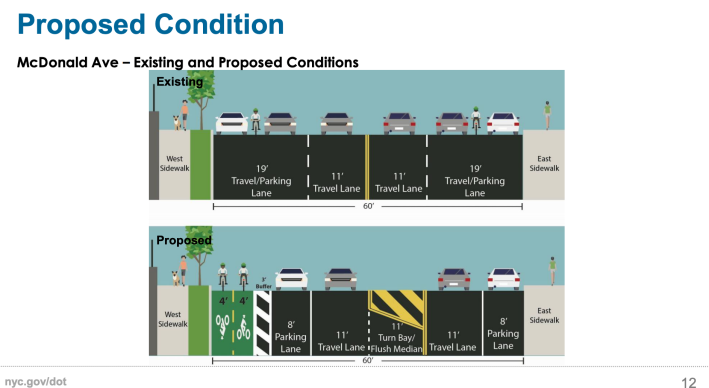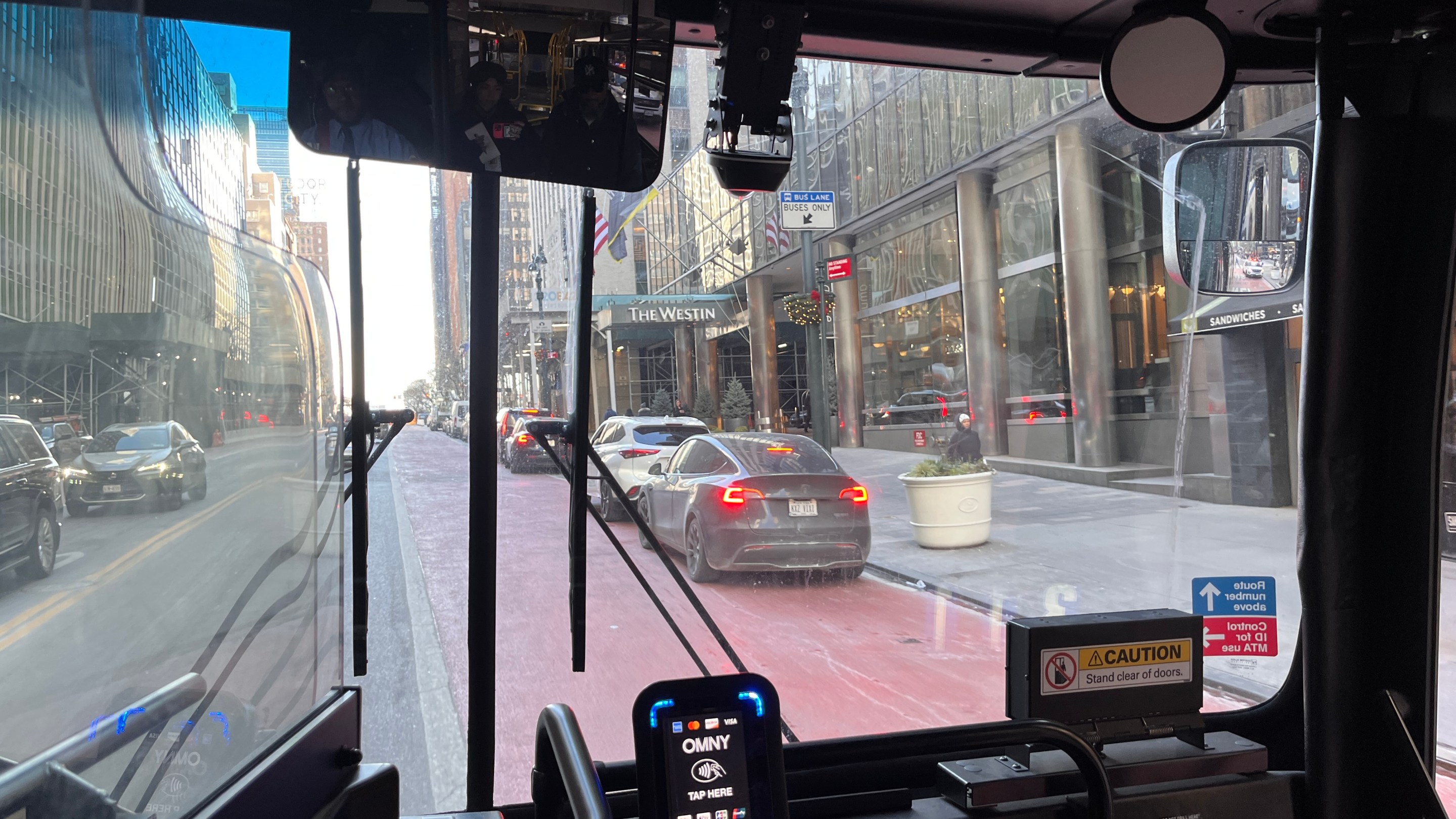Leave it to the City Council's Transportation Committee to make a bus oversight hearing entirely about drivers.
The committee spent what was possibly its last bus oversight hearing of its term asking the MTA and city to pull back on bus lane enforcement — proposing one roadblock after another to faster service for bus riders while pushing onerous (and unenforceable) new demands on the city Department of Transportation.
Council members on Thursday seemed blissfully unaware of their role in blocking DOT's efforts to speed up buses as they alternated between calling on the agency to meet the legally-required goals of the 2019 Streets Master Plan and criticizing its efforts to do just that.
As Mayor Adams wraps up his four-year City Hall tenure, New York City's slowest-in-the-nation buses are still stuck moving at around eight miles per hour (slower during peak periods), while drivers remain emboldened to block bus lanes and bus stops and double park anywhere they want. In a minor miracle, Albany legislators have actually given the MTA and DOT the power to clear the way for buses with bus-mounted cameras, which issue tickets to drivers who illegal block the path of bus riders.
So of course, two members of the Transportation Committee used a chunk of their time to insist the bus lane cameras actually work too well.
Council Member Mercedes Narcisse (D-Canarsie), for instance, pushed a bill to permit the city issue just one ticket per hour to drivers who park or drive in the bus lane. In her written testimony, Narcisse called on her colleague to "protect" drivers' ability to obstruct mass transit.
"Right now, too many New Yorkers are opening their mailboxes to find multiple tickets all from a single stretch of roadway simply because multiple cameras captured the same continuous, bus lane violation," she said, insisting it was simply common sense to allow drivers to stay in a bus lane for as long as they felt like it.
"I believe this is fair and common sense protection for our drivers, many of whom are struggling to make ends meet," Narcisse said in a cynical deployment of the affordability rhetoric that just swept Zohran Mamdani into City Hall. Only 37 percent of Narcisse's constituents drive themselves to work and more take transit, yet the Council member did not offer a single comment about bus riders.
Joining Narcisse in the keep-buses-slow caucus was Council Member Farah Louis (D-Flatbush), who had an interminable back-and-forth with a pair of MTA executives on whether people are allowed to park in bus stops or double park on bus routes if they're doing it for God.
"What we've shared with your team is there are parishioners, faith-based institutions that are exempt from getting tickets on Flatbush Avenue ... folks have gotten up to $2,000 in tickets," Louis told MTA New York City Transit President Demetrius Chrichlow and MTA Chief of Policy and External Relations John McCarthy.
"I think the specific scenario of an exemption from following the law just doesn't exist," Crichlow responded, accurately. The law, if anything, gives a wide grace period for "drop offs," McCarthy noted. Drivers must have their license plate read by two buses five minutes apart in order to receive a violation. That allows plenty of time for someone to make a quick and harmless passenger drop-off.
DOT and MTA officials also took questions about a bill to require the city's transportation agency provide notice to every homeowner or business within 50 feet of a bus stop that's added or removed. Bill sponsor and Committee Chair Selvena Brooks-Powers (D-Far Rockaway) asked the MTA if it could send someone to knock on individual doors every time a bus stop was moved or created.
It was later left to Diniece Mendes, the DOT's assistant commissioner for transit development, to lay out the stakes of Brooks-Powers's exhausting make-work proposal and what it could mean for the agency's actual priorities.
"Nearly 12,000 bus stop panels were installed, removed and maintained as part of the Queens bus network redesign," Mendes said in her testimony. "Although DOT supports the intent of this bill to increase awareness of any changes to bus stops, the legislation presents challenges that are beyond our limited staff capacity and would delay implementation of critical safety, accessibility and service reliability improvements."
Even when the Streets Master Plan came up, it was so Brooks-Powers could ask her semi-annual questions on whether the DOT was going to hit the plan's legally mandated target of 30 miles of bus lanes per year.
Brooks-Powers immediately demonstrated how City Council members themselves are an impediment to getting the work done by pushing the DOT to do more outreach on the redesign of Brooklyn's McDonald Avenue, which fills in a gap in the protected bike lane network next to the Green-Wood Cemetery.

It was unclear what this project — miles from Brooks-Powers's district — had to do with a bus oversight hearing, but the Transportation Committee chair's ask for more delays to the half-mile protected bike lane next to a graveyard demonstrated why the DOT might be gun-shy about trying to install 30 miles of bus lanes or 50 miles of bike lanes per year.
Yet there were so many things the committee members could have asked about:
They could have asked about all-door boarding three years after MTA Chairman and CEO Janno Lieber began to bury it — and its promise of speeding up buses.
There were no questions about the Street Master Plan mileage targets, three years after DOT told the MTA that it would not ever meet them because of staff shortages, and months after the DOT itself said City Hall was kneecapping those efforts.
And not one Council member wanted to talk about bus lane design, as the DOT begins an ambitious full-scale redesign of Flatbush Avenue anchored by center running bus lanes.
Or about bus rapid transit.
Or how the city's original busways are doing and what the city and MTA have learned from them.
There wasn't a single question on the city's response to the Trump administration's threats over the 34th Street busway or what was going on with the Tremont Avenue busway.
Once upon a time, under then-chair and current DOT Commissioner Ydanis Rodriguez, the Council Transportation Committee provided a space for elected officials, advocates and government bureaucrats to engage in productive dialogue about improving mass transit and road safety in a city where people who bike, walk or ride transit to work outnumber people who commute by car. Rodriguez's committee moved one bill after another in support of the city's "Vision Zero" goals of reducing traffic violence and car dependence — culminating in the passage of the Streets Master Plan.
But the committee now serves as a space for car-first pols to push back on such changes — advancing proposals designed to delay street redesigns like Republican Minority Leader Joann Ariola's bill that required DOT notify Council members every time it repurposes any curbside parking spot, or another Ariola bill that required DOT meet directly with local fire houses (rather than FDNY leadership) before redesigning a street. Both bills effectively added more busy work for DOT and delays to its ability to meet the benchmarks established in the Streets Master Plan that Chair Brooks-Powers professes to support.
It’s reasons like this that I introduced and passed INT 104 which requires the @NYC_DOT to confer with local affected @FDNY firehouses and submit to the Department of Transportation certain information, before DOT approves Open Street applications or implements major… https://t.co/URgQewERw2
— Joann Ariola NYC Council District 32 (@JoannAriola32) January 26, 2025
This is how 2025 is ending, but in 2026 a mayor who centered bus service is moving into City Hall. It can't simply be up to Streetsblog and our colleagues in the media to ask the hard questions.
Wait 'til next year.






